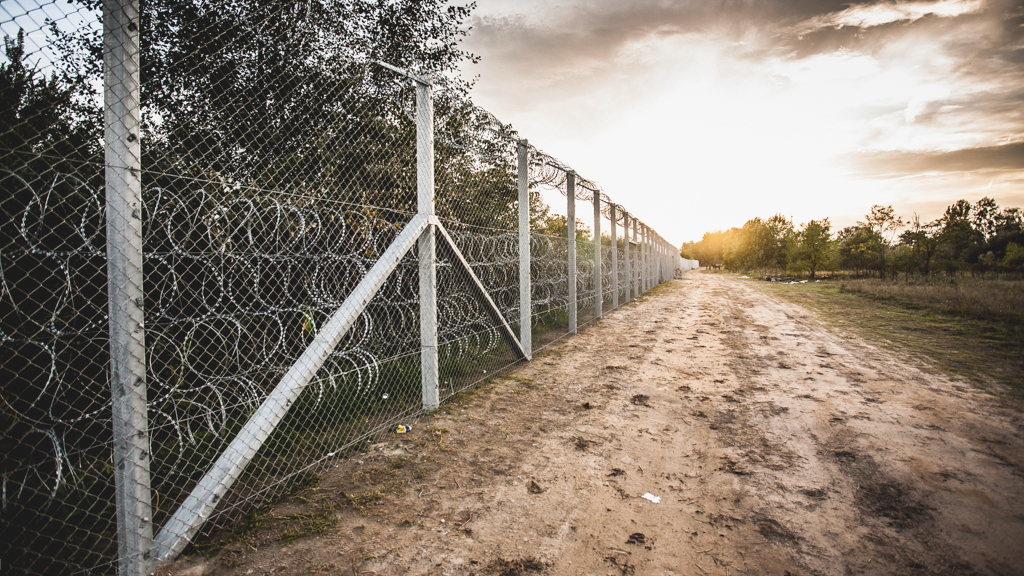|
Neo-fascism
Neo-fascism is a post-World War II far-right ideology which includes significant elements of fascism. Neo-fascism usually includes ultranationalism, ultraconservatism, racial supremacy, right-wing populism, authoritarianism, nativism, xenophobia, and anti-immigration sentiment, as well as opposition to social democracy, parliamentarianism, Marxism, communism, socialism, liberalism, neoliberalism, and liberal democracy. Allegations that a group is neo-fascist may be hotly contested, especially when the term is used as a political epithet. Some post-World War II regimes have been described as neo-fascist due to their authoritarian nature, and sometimes due to their fascination with and sympathy towards fascist ideology and rituals. History According to Jean-Yves Camus and Nicolas Lebourg, the neo-fascist ideology emerged in 1942, after Nazi Germany invaded the USSR and decided to reorient its propaganda on a Europeanist ground. Europe then became both the myt ... [...More Info...] [...Related Items...] OR: [Wikipedia] [Google] [Baidu] |
Pan-European Nationalism
European nationalism (sometimes called pan-European nationalism) is a form of pan-nationalism based on a pan-European identity. It is considered minor since the National Party of Europe disintegrated in the 1970s. It is distinct from Pro-Europeanism and European Federalism in being a chiefly neo-fascist ideology, as opposed to support of the European Union and European integration. History The former British Union of Fascists leader, Oswald Mosley, led the Union Movement and advocated its " Europe a Nation" policy from 1948 to 1973. In 1950, Mosley co-founded the European Social Movement and collaborated with comparable groups on the Continent. The organisation was mostly defunct by 1957 and was succeeded by the National Party of Europe, which was formed in 1962 by Mosley and the leaders of the German nationalist Deutsche Reichspartei, the Italian Social Movement, Jeune Europe and the Mouvement d'Action Civique. The movement remained active during the 1960s but was mos ... [...More Info...] [...Related Items...] OR: [Wikipedia] [Google] [Baidu] |
Right-wing Populism
Right-wing populism, also called national populism and right populism, is a political ideology that combines right-wing politics with populist rhetoric and themes. Its rhetoric employs anti- elitist sentiments, opposition to the Establishment, and speaking to or for the common people. Recurring themes of right-wing populists include neo-nationalism, social conservatism, economic nationalism, and fiscal conservatism. Frequently, they aim to defend a national culture, identity, and economy against attacks by outsiders. Right-wing populism has associations with authoritarianism, while some far-right populists draw comparisons to fascism. Right-wing populism in the Western world is sometimes associated with ideologies such as anti-environmentalism, anti-globalization, nativism, and protectionism. In Europe, the term is often used to describe groups, politicians, and political parties generally known for their opposition to immigration, especially from the Muslim world, ... [...More Info...] [...Related Items...] OR: [Wikipedia] [Google] [Baidu] |
Aftermath Of World War II
The aftermath of World War II saw the rise of two global superpowers, the United States (U.S.) and the Soviet Union (U.S.S.R.). The aftermath of World War II was also defined by the rising threat of nuclear warfare, the creation and implementation of the United Nations as an intergovernmental organization, and the decolonization of Asia, Oceania, South America and Africa by European and East Asian powers, most notably by the United Kingdom, French Fourth Republic, France, and Occupation of Japan, Japan. Once Allies of World War II, allies during World War II, the U.S. and the U.S.S.R. became competitors on the world stage and engaged in the Cold War, so called because it never resulted in overt, declared total war between the two powers. It was instead characterized by espionage, political subversion and proxy wars. Western Europe was rebuilt through the American Marshall Plan, whereas Central and Eastern Europe fell under the Soviet sphere of influence and eventually behind an " ... [...More Info...] [...Related Items...] OR: [Wikipedia] [Google] [Baidu] |
Fascism
Fascism ( ) is a far-right, authoritarian, and ultranationalist political ideology and movement. It is characterized by a dictatorial leader, centralized autocracy, militarism, forcible suppression of opposition, belief in a natural social hierarchy, subordination of individual interests for the perceived interest of the nation or Race (human categorization), race, and strong regimentation of society and the economy. Opposed to communism, democracy, liberalism, Pluralism (political philosophy), pluralism, and socialism, fascism is at the far right of the traditional left–right spectrum.; ; ; ; ; ; ; ; ; ; ; ; ; Fascism rose to prominence in early-20th-century Europe. The first fascist movements Italian fascism, emerged in Italy during World War I, before Fascism in Europe, spreading to other European countries, most notably Nazi Germany, Germany. Fascism also had adherents outside of Europe. Fascists saw World War I as a revolution that brought massive changes to the nature ... [...More Info...] [...Related Items...] OR: [Wikipedia] [Google] [Baidu] |
Anti-immigration
Opposition to immigration, also known as anti-immigration, is a political position that seeks to restrict immigration. In the modern sense, immigration refers to the entry of people from one state or territory into another state or territory in which they are not citizens. Illegal immigration occurs when people immigrate to a country without having official permission to do so. Opposition to immigration ranges from calls for various immigration reforms, to proposals to completely restrict immigration, to calls for repatriation of existing immigrants. Anti-immigration arguments National identity Whether and how national identity affects attitudes toward immigration depends heavily on the meanings associated with a particular national identity. If a national identity is defined in an exclusionary way that targets ethnic or racial groups, or if an ethnic or racial majority dominates in the political structures of a nation, then that national identity is likely to be associat ... [...More Info...] [...Related Items...] OR: [Wikipedia] [Google] [Baidu] |
Nicolas Lebourg
Nicolas Lebourg (born 1974) is a French historian who specializes on far-right movements in Europe. Biography Born in 1974, Lebourg studied sociology at Aix-Marseille University and history at the University of Perpignan, from which he graduated with a PhD in contemporary history in 2005, after a thesis on French national revolutionaries during the period 1940–2002. Between 2015 and 2017, he was a research fellow in the program "History of fascism in Europe and Eurasia" at George Washington University, under the supervision of French historian Marlène Laruelle. In 2017–2018, he was a project researcher in the study group "The Far Right in Europe and Russia’s Role and Influence" for the Carnegie Council for Ethics in International Affairs. Lebourg also comments on the current political events in various newspapers such as ''Slate'', ''Mediapart'' and ''Libération (), popularly known as ''Libé'' (), is a daily newspaper in France, founded in Paris by Jean-Pau ... [...More Info...] [...Related Items...] OR: [Wikipedia] [Google] [Baidu] |
Ultranationalism
Ultranationalism, or extreme nationalism, is an extremist form of nationalism in which a country asserts or maintains hegemony, supremacy, or other forms of control over other nations (usually through violent coercion) to pursue its specific interests. Ultranationalist entities have been associated with the engagement of political violence even during peacetime. In ideological terms, scholars such as the British political theorist Roger Griffin found that ultranationalism arises from seeing modern nation states as living organisms. In stark mythological ways, political campaigners have divided societies into those that are perceived as being degenerately inferior and those perceived as having great cultural destinies. Ultranationalism has been an aspect of fascism, with historic governments such as the regimes of Fascist Italy and Nazi Germany building on ultranationalist foundations by using specific plans for supposed widespread national renewal. Another major example was the ... [...More Info...] [...Related Items...] OR: [Wikipedia] [Google] [Baidu] |
Fascism
Fascism ( ) is a far-right, authoritarian, and ultranationalist political ideology and movement. It is characterized by a dictatorial leader, centralized autocracy, militarism, forcible suppression of opposition, belief in a natural social hierarchy, subordination of individual interests for the perceived interest of the nation or Race (human categorization), race, and strong regimentation of society and the economy. Opposed to communism, democracy, liberalism, Pluralism (political philosophy), pluralism, and socialism, fascism is at the far right of the traditional left–right spectrum.; ; ; ; ; ; ; ; ; ; ; ; ; Fascism rose to prominence in early-20th-century Europe. The first fascist movements Italian fascism, emerged in Italy during World War I, before Fascism in Europe, spreading to other European countries, most notably Nazi Germany, Germany. Fascism also had adherents outside of Europe. Fascists saw World War I as a revolution that brought massive changes to the nature ... [...More Info...] [...Related Items...] OR: [Wikipedia] [Google] [Baidu] |
Far-right Politics
Far-right politics, often termed right-wing extremism, encompasses a range of ideologies that are marked by ultraconservatism, authoritarianism, ultranationalism, and Nativism (politics), nativism. This political spectrum situates itself on the far end of the right-wing politics, right, distinguished from more mainstream right-wing ideologies by its opposition to Liberal democracy, liberal democratic norms and emphasis on Exclusivism, exclusivist views. Far-right ideologies have historically included fascism, Nazism, and Falangism, while contemporary manifestations also incorporate neo-fascism, neo-Nazism, white supremacy, and various other movements characterized by chauvinism, xenophobia, and theocratic or reactionary beliefs. Key to the far-right worldview is the notion of societal purity, often invoking ideas of a homogeneous "national" or "ethnic" community. This view generally promotes organicism, which perceives society as a unified, natural entity under threat from D ... [...More Info...] [...Related Items...] OR: [Wikipedia] [Google] [Baidu] |
Operation Barbarossa
Operation Barbarossa was the invasion of the Soviet Union by Nazi Germany and several of its European Axis allies starting on Sunday, 22 June 1941, during World War II. More than 3.8 million Axis troops invaded the western Soviet Union along a front, with the main goal of capturing territory up to a line between Arkhangelsk and Astrakhan, known as the A-A line. The attack became the largest and costliest military offensive in history, with around 10 million combatants taking part in the opening phase and over 8 million casualties by the end of the operation on 5 December 1941. It marked a major escalation of World War II, opened the Eastern Front—the largest and deadliest land war in history—and brought the Soviet Union into the Allied powers. The operation, code-named after the Holy Roman Emperor Frederick Barbarossa ("red beard"), put into action Nazi Germany's ideological goals of eradicating communism and conquering the western Soviet Union to repopulate it w ... [...More Info...] [...Related Items...] OR: [Wikipedia] [Google] [Baidu] |
Nazi Germany
Nazi Germany, officially known as the German Reich and later the Greater German Reich, was the German Reich, German state between 1933 and 1945, when Adolf Hitler and the Nazi Party controlled the country, transforming it into a Totalitarianism, totalitarian dictatorship. The Third Reich, meaning "Third Realm" or "Third Empire", referred to the Nazi claim that Nazi Germany was the successor to the earlier Holy Roman Empire (800–1806) and German Empire (1871–1918). The Third Reich, which the Nazis referred to as the Thousand-Year Reich, ended in May 1945, after 12 years, when the Allies of World War II, Allies defeated Germany and entered the capital, Berlin, End of World War II in Europe, ending World War II in Europe. After Hitler was appointed Chancellor of Germany in 1933, the Nazi Party began to eliminate political opposition and consolidate power. A 1934 German referendum confirmed Hitler as sole ''Führer'' (leader). Power was centralised in Hitler's person, an ... [...More Info...] [...Related Items...] OR: [Wikipedia] [Google] [Baidu] |







